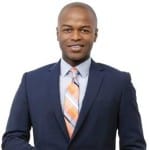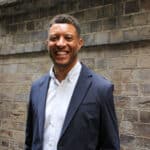
Feb 10, 2016
I was recently in Hong Kong on a business trip. While sat in the hotel hot tub after a long flight I found myself speaking to a very charismatic American gentleman (as you do) who soon joined the group I was with for a beer or two. For the next couple of days, we spent a lot of time together socialising, and I soon found out that this now friend was Kendis Gibson the Emmy Award Winning ABC News anchor from the USA.
I was intrigued by Kendis’s career choice along with the skill set, experience and tales it provided. Kendis kindly agreed to share some of his insight and learning as part of the Precision Sourcing SourceIT blog. I hope you enjoy it.
Simon Hair
As an anchor and reporter, you appear every day in front of millions of people and manage to come across very relaxed, natural but serious. How do you prepare mentally and physically for it?
Not sure if there’s a way of preparing to be relaxed in front of millions of viewers every day, but I just try to be genuine, and be me. I’m pretty much the same person on camera as I am off… and I hope by being a likeable individual in person, that translates on camera. So I just try to be alert, try to be in a good mood, because no one wants to wake up to anyone, cranky, tired or bored in person, much less turn on their televisions in their bedrooms or living rooms and invite that sort of personality in.
How do you use body language to communicate?
Body language says so much. I try to utilise the whole “smizing” smiling with your eyes concept that Tyra Banks coined, it gives an audience an impression (genuine mind you) of someone excited to see you. I try to have a more relaxed approached with my body. As much as many of us would like to think we have great posture, we don’t mostly. So I try to replicate our everyday positioning. My hand movements and gestures are usually more overt because they translate better than smaller body movements.
How long will you usually practice or rehearse a report for? How much time goes into preparing for what appears such a small amount of time, however, it must feel like a lifetime when live on air.
It depends on what I’m preparing for. If I’m preparing for a live report I’ll practice the moves and language several times before hand, and also, try to make sure that dance is also good with my camera operator and producer. If I’m anchoring, I think it’s an always research… which means, regularly reading in and studying different topics from a wide arrange of issues.
What has been the most challenging moment in your career?
This questionnaire. Not sure. Every day is a challenge on an equal scale for me. To be funny, to be engaging, to be liked by our audience, and by people, I meet in person.
Who has been the most interesting person you have ever interviewed or met in your professional career?
I love Beyoncé. Found her very poised smart driven and genuine. Met her several times over her career, from when she was destiny’s child to a solo career. My favourite interview with her was post her Grammys performance with Prince about ten years ago. Despite killing on stage and being there with a music legend, she was still very humble and overwhelmed backstage.
Finally, could you give some advice to young people who would like to start a career like yours?
Generally speaking, I think just study. Read a lot. Try to know a little about a lot of things. I can travel anywhere in this world and based on my travels and reading; I feel I can hold a conversation with virtually anyone, and have a common topic with the vast majority.



